Think of Jersey, and the words "Bergerac" and "tax haven"
Page 39
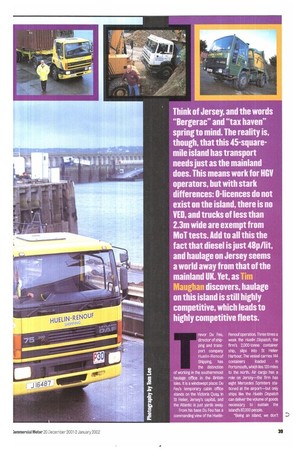
Page 40
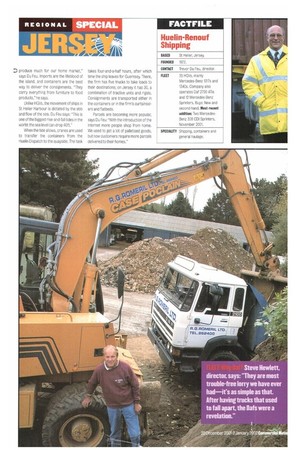
Page 41
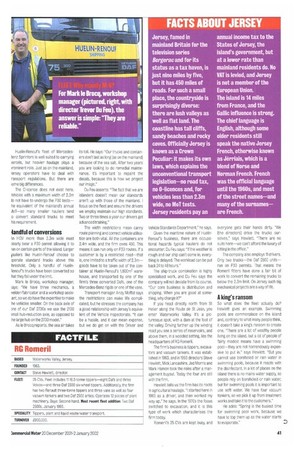
Page 42
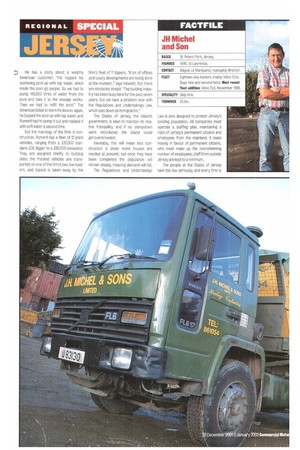
Page 43
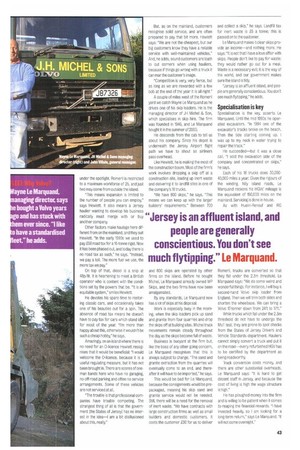
If you've noticed an error in this article please click here to report it so we can fix it.
spring to mind. The reality is, though, that this 45-squaremile island has transport needs just as the mainland does. This means work for HGV operators, hut with stark differences: 0-licences do not exist on the island, there is no VED, and trucks of less than 2.3m wide are exempt from MoT tests. Add to all this the fact that diesel is just 48p/lit, and haulage on Jersey seems a world away from that of the mainland UK. Yet, as Tim Maughan discovers, haulage on this island is still highly competitive, which leads to highly competitive fleets.
r Du Feu, director of shipping and transport comparw Huelin-Renouf Shipping, has the distinction of working in the southernmost haulage office in the British Isles. It is a windswept place: Du Feu 's temporary cabin office stands on the Victoria Quay, in St Helier, Jersey's capital, and the Atlantic is just yards away.
From his base Du Feu has a commanding view of the Huelin Renouf operation. Three times a week the Hudin Dispatch, the firm's 2,000-tonne container ship, slips into St Helier Harbour. The vessel carries 144 containers loaded in Portsmouth, which lies 120 miles to the north. Air cargo has a role on Jersey—the firm has eight Mercedes Sprinters stationed at the airport—but only ships like the Hue/in Dispatch can deliver the volume of goods necessary to sustain the island's 87.000 people.
"Being an island, we don't
0 produce much for our home market," says Du Feu. Imports are the lifeblood of the island, and containers are the best way to deliver the consignments. They carry everything from furniture to food products," he says.
Unlike HGVs, the movement of ships in St Helier Harbour is dictated by the ebb and flow of the sea. Cu Feu says: This is one of the biggest rise-and-fall tides in the world: the sea level can drop Wt."
When the tide allows, cranes are used to transfer the containers from the Huelin Dispatch to the quayside. The task
takes four-and-a-half hours, after which time the ship leaves for Guernsey There, the firm has five trucks to take loads to their destinations; on Jersey it has 30, a combination of tractive units and rigids. Consignments are transported either in the containers or in the firm's curtainsiders and flatbeds.
Parcels are becoming more popular, says Du Feu: With the introduction of the Internet more people shop from home. We used to get a lot of palletised goods, but now customers require more parcels delivered to their homes."
Huelin-Renouf's fleet of Mercedesienz Sprinters is well suited to carrying same's, but heavier haulage plays a wominent role. Just as on the mainland, iersey operators have to deal with ransport regulations. But there are iome big differences.
The 0-licence does not exist here. /ehicles with a maximum width of 2.3m lo not have to undergo the P30 tests— he equivalent of the mainland's annual AoT—so many smaller hauliers tend convert standard trucks to meet his requirement.
iandful of conversions
n HGV more than 2.3m wide must dearly bear a P30 permit allowing it to 'un on certain parts of the island. Larger pullers like Huelin-Renouf choose to )perate standard trucks above this hreshold. Only a handful of Huelin3enouf's trucks have been converted so hat they fall under the limit.
Mark Is Brocq, workshop manager, ays; "We have three mechanics, a velder/fabrcator and a workshop assisant, so we do have the expertise to make he vehicles smaller. On the back axle of we of our Daf 2700s we use the 2100 mall hub-reduction axle, as opposed to he large hub on the 2700 model."
As Is Brocq reports, the sea air takes its toll. He says: "Our trucks and containers don't last as long [as on the mainland] because of the sea salt. After two years you are looking to do remedial maintenance. It's important to repaint the decals, because this is how we project our image."
Du Feu asserts: "The fact that we are islanders doesn't mean our standards aren't up with those of the mainland. I focus on the fleet and ensure the drivers we employ maintain our high standards. Two or three times a year our drivers get advanced training."
The width restrictions mean canny route planning and correct vehicle utilisation are both vital, All the containers are 2.4m wide, and the firm owns 450. This means it can run only on P30 routes. If a customer is by a restricted road—that is, one limited to a traffic width of 2.3m— goods have to be taken out of the container at Huelin-Renouf's 1,800m2 warehouse, and transported by one of the firm's three converted Dais, one of the Mercedes-Benz rigids or one of the vans.
Transport manager Andy Moffat says the restrictions can make life complicated, but he stresses the company has a good relationship with Jersey's equivalent of the Vehicle Inspectorate. "It can be a hassle, and it can mean expense, but we do get on with the Driver and Vehicle Standards Department," he says.
Given the maritime nature of HuelinRenours business, there are occupational hazards typical hauliers do not encounter. Du Feu says: "If the weather is rough and our ship can't come in, everything is delayed. The workload can be put back 24 to 48 hours," The ship-truck combination is highly specialised work, and Du Feu says the company will not deviate from its course. Our core business is distribution and shipping. When you are good at something, why change it?"
If you head directly north from St Helier along the Route de St Jean, you enter Waterworks Valley. It's a picturesque spot, with a dam at the foot of the valley. Driving further up the winding road you see a series of reservoirs, and above them, in a wooded setting, lies the headquarters of HG Romeril.
The firm's business is tippers, excavators and vacuum tankers. It was established in 1963, and in 1993 directors Steve Hewlett, Mick Lancashire, Jed Morris and Mark Hamon took the reins after a management buyout. Today the four are still with the firm.
Hewlett tells us the firm has its roots in agricultural haulage. "I started here in 1965 as a driver, and then worked my way up," he says. In the 1970s the focus switched to excavation, and it is this type of work which characterises the firm today.
Romerli's 25 CVs are kept busy, and everyone gets their hands dirty. "We [the directors] drive the trucks ourselves," says Hewlett. 'There are no suits here—we can't afford the luxury of sitting in the office."
The company also employs 11 drivers. Only two trucks—the Daf 2500 units— run on P30 permits. That means the Romeril fitters have done a fair bit of work to convert the remaining trucks to below the 2.3m limit. On Jersey such big mechanical projects are a way of life.
A kines ransom
So what does the fleet actually do? Hewlett gives an example. Swimming pools are commonplace on the island and, contrary to what many people think, it doesn't take a king's ransom to create one. "There are a lot of wealthy people living on the island, but a lot of people of fairly modest means have a swimming pool—they are not horrendously expensive to put in," says Hewlett. "But you cannot use boreholed or rain water in swimming pools, because it reacts with the disinfectant. In a lot of places on the island there is no mains water supply, so people rely on boreholed or rain water, but for swimming pools it is important to use soft water. We have four vacuum tankers, so we pick it up from treatment works and take it to the customers."
He adds: "Spring is the busiest time for swimming pool work, because we have to top them up as the water starts to evaporate," He has a story about a wealthy American customer: He topped his swimming pool up with tap water, which made the pool go purple. So we had to pump 145,000 litres of water from the pool and take it to the sewage works. Then we had to refill the pool." The American failed to learn his lesson: again, he topped the pool up with tap water, and Romeril had to pump it out and replace it with soft water a second time.
But the mainstay of the firm is construction. Romeril has a fleet of 12 plant vehicles, ranging from a £37,000 standard JCB digger to a .£90,000 excavator. They are assigned chiefly to building sites: the tracked vehicles are transported on one of the firm's two low-loaders, and topsoil is taken away by the firm's fleet of 11 tippers. "A lot of offices and luxury developments are being done at the moment," says Hewlett. But there are obstacles ahead: "The building industry has been busy here for the past seven years, but we have a problem now with the Regulations and Undertakings Law, which cuts down on immigration."
The States of Jersey, the island's government, is keen to maintain its relative tranquillity, and if no clampdown were introduced the island could get overcrowded.
Inevitably, this will mean less construction is done: more houses are needed at present, but once they have been completed the population will remain steady, meaning demand will fall.
The Regulations and Undertakings
Law is also designed to protect Jersey's existing population. All companies must operate a staffing plan, maintaining a ratio of Jersey's permanent citizens and employees from the mainland. It leans heavily in favour of permanent citizens, who must make up the overwhelming number of employees; staff from outside Jersey are kept to a minimum.
The people at the States of Jersey take this law seriously, and every firm is
under the spotlight. Romeril is restricted to a maximum workforce of 25, and just two may come from outside the island.
'This means expansion is limited to the number of people you car employ," says Hewlett. It also means a Jersey
haulier wanting to develop his business •
radically must merge with or buy another company.
Other factors make haulage here different from on the mainland, and they suit Hewlett. "In the early 1990s we used to pay £58 road tax for a 16-tonne rigid. Now it has been phased out, and today there is no road tax as such," he says. "Instead, we pay a toll. The more fuel we use, the more tax we pay" On top of that, diesel is a snip at 48p/lit. It is heartening to meet a British operator who is content with the conditions set by the powers that be. "It is an equitable system," smiles Hewlett.
He devotes his spare time to restoring classic cars, and occasionally takes one of his beauties out for a spin. The absence of road tax means he doesn't have to pay tax for cars which stand idle for most of the year. "I'm more than happy about this, otherwise it wouldn't be such a cheap hobby," he says.
Amazingly, on an island where there is no need for an 0-licence Hewlett recognises that it would be beneficial: "I would welcome the 0-licence, because it is a useful regulating measure, but it has not been brought in. There are scores of oneman bands here who have no garaging, no off-road parking and often no service arrangements. Some of these vehicles are not serviced at all.
"The trouble is that professional companies have trouble competing. The strangest thing of all is that the government [the States of Jersey] has no interest in the idea—I am a bit disillusioned about this, really." But, as on the mainland, customers recognise solid service, and are often prepared to pay that bit more. Hewlett says: "We are not the cheapest, but our big customers know they have a reliable service with well-maintained vehicles." And, he adds, sound customers are loath to cut corners when using hauliers, because if things go wrong with a truck it can mar the customer's image.
"Competition is very, very fierce, but as long as we are rewarded with a few bob at the end of the year it is all right."
A couple of miles west of the Homeril yard we catch Wayne Le Marquand as he drives one of his skip loaders. He is the managing director of JI-i Michel & Son, which specialises in skip hire. The firm was founded in 1946, and Le Marquand bought it in the summer of 2000.
He descends from the cab to tell us about his company. Since his depot is underneath the Jersey Airport flight path we have to shout as airliners pass overhead.
Like Hewlett, he is making the most of the construction boom. Most of the firm's work involves dropping a skip off at a construction site, loading up inert waste and delivering it to landfill sites in one of the company's 18 trucks.
'We have BOO skips,' he says. "This means we can keep up with the larger builders' requirements." Between 700 and BOO skips are operated by other firms on the island. Before he bought Michel, Le Marquand already owned WP Skips, and the two firms have now been amalgamated.
By any standards, Le Marquand now has a lot of skips at his disposal.
Work is especially busy in the morning, when the skip loaders pick up sand and granite from four quarries and drop the skips off at building sites. Michel truck movements remain steady throughout the day as the skips become full of waste.
Business is buoyant at the firm but, like the boss of any other going concern, Le Marquand recognises that this is always subject to change. "The sand and granite extraction from the quarries will eventually come to an end, and thereafter it will have to be imported," he says.
This would be bad for Le Marquand, because the consignments would be prepackaged, meaning his skip sand and granite service would not be needed. Still, there will be a need for the removal of inert waste. "We have contracts with large construction firms as well as small builders and domestic customers. It costs the customer 130 for us to deliver and collect a skip, he says. Landfill tax for inert waste is £5 a tonne; this is passed on to the customer, Le Marquand makes it clear skips provide an income—and nothing more. He says: "It is not that I have a love affair with skips. People don't like to pay for waste: they would rather go out for a meal. Waste is a necessary evil: it is the way of the world, and our government makes sure the island is tidy.
"Jersey is an affluent island, and people are generally conscientious. You don't see much flytipping," he adds.
Specialisation is key
Specialisation is the key, asserts Le Marquand. Until the mid 1990s he operated excavators. "In 1994 one of the excavator's tracks broke on the beach. Then the tide starting coming up. I was up to my neck in water trying to repair the track."
He succeeded—but it was a close call. "I sold the excavation side of the company and concentrated on skips," he says.
Each of his 18 trucks does 30,00040,000 miles a year. Given the rigours of the winding, hilly island roads, Le Marquand reckons his HGVs' mileage is the equivalent of 150,000 miles on the mainland. Servicing is done in-house.
As with Huelin-Renouf and AG Romeril, trucks are converted so that they fail under the 2.3m threshold. Le Marquand says: 'We do some weird and wonderful things. For instance, I will buy a second-hand Volvo skip loader from England. Then we will trim both sides and shorten the wheelbase. We can bring a Volvo 17-tcnner down from 24ft to 17ft."
While trucks which fall under the 2.3m threshold do not have to undergo the MoT test, they are prone to spot checks from the States of Jersey Drivers and Vehicle Standards department, Hauliers cannot simply convert a truck and put it on the road—every refurbished HGV has to be certified by the department as being roadworthy.
Truck conversion costs money, and there are other substantial overheads. Le Marquand says: "It is hard to get decent staff in Jersey, and because the cost of living is high the wage structure is high."
He has ploughed money into the firm and is willing to be patient when it comes to reaping the financial rewards. have invested heavily, so I am looking for a long-term return," says Le Marquand. "It will not come overnight."




























































































































































